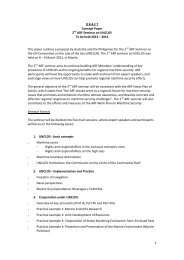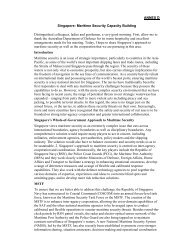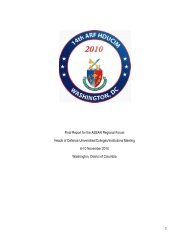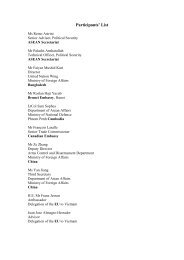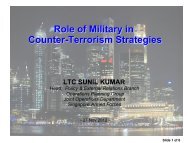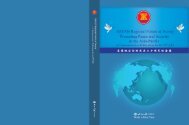Concept Paper (Best Practice Reference Paper for Peace-building) 1 ...
Concept Paper (Best Practice Reference Paper for Peace-building) 1 ...
Concept Paper (Best Practice Reference Paper for Peace-building) 1 ...
Create successful ePaper yourself
Turn your PDF publications into a flip-book with our unique Google optimized e-Paper software.
<strong>Concept</strong> <strong>Paper</strong>(<strong>Best</strong> <strong>Practice</strong> <strong>Reference</strong> <strong>Paper</strong> <strong>for</strong> <strong>Peace</strong>-<strong>building</strong>)1 . Background<strong>Peace</strong>-<strong>building</strong> missions are increasingly becoming complex challengesrequiring regional cooperation . In the Asia-Pacific region, ARF members aremore involved in peace-<strong>building</strong> around the globe both in military and civilianterms, which necessitates a more cooperative and integrated approach in theregion including the sharing of in<strong>for</strong>mation and best practices .ARF members are seeking more practical cooperation in such areas asdisaster relief, counter-terrorism, transnational crime and maritime security .Tangible outcomes are already seen in some of these areas, such as guidelines orexercises .In addition, in the field of peace-<strong>building</strong>, progress has been made suchas the launching of the <strong>Peace</strong>keeping Experts' Meeting in 2007 . We considerthat peace-<strong>building</strong> could be a potential area in which cooperation among ARFmembers could be further developed in the future .Also, in this context, the Japanese Ministry of Defense hosted the 7` hSub-committee of the Tokyo Defense Forum on 27 th and 28th February 2008where participants from twenty-five countries and four internationalorganizations discussed a draft <strong>Best</strong> <strong>Practice</strong> <strong>Reference</strong> <strong>Paper</strong> <strong>for</strong><strong>Peace</strong>-<strong>building</strong> . Some participants suggested that it be reported to the ARF <strong>for</strong>further consideration .2. ProposalJapan proposes as an activity of the ARF in the inter-Session covering2008-2010 ;to co-host <strong>Peace</strong>keeping Experts' Meetings in the next Inter-Sessional period .to elaborate on a <strong>Best</strong> <strong>Practice</strong> <strong>Reference</strong> <strong>Paper</strong>, <strong>for</strong> <strong>Peace</strong>-<strong>building</strong> with aview to sharing experiences and lessons learned by each ARF member frompreparation to operation . The result is to be reported to the MinisterialMeeting in two-years' time .Japan hopes that the holding of <strong>Peace</strong>keeping Experts' Meeting and theelaboration of the <strong>Best</strong> <strong>Practice</strong> <strong>Reference</strong> <strong>Paper</strong> will contribute to deepeningthe cooperation in this field .
The 7th Sub-committee of the Tokyo Defense Forum (TDF)Summary by the Chair(Tokyo, 28 February 2008)Introductionl . The 7' h Sub-committee of the Tokyo Defense Forum (Forum <strong>for</strong> Defense.Authorities in the Asia-Pacific Region) was held in Tokyo from February 27`F'through 28' x ' 2008, with the participation of twenty-five countries (Australia,Bangladesh, Brunei Darussalam, Kingdom of Cambodia, Canada, People'sRepublic of' China, India, Republic of Indonesia ., Japan, Laos, Malaysia,Mongolia, Union of Myanmar, New Zealand, Islamic Republic of Pakistan,Papua New Guinea . Republic of the Philippines, Republic of Korea, RussianFederation, Republic of Singapore, Democratic Socialist Republic of Sri Lanka,Kingdom of Thailand, Timor-Leste, the United States of America, SocialistRepublic of Viet Nat)) and the European Union . Three organizations (ASEANSecretariat. International Committee of Red Cross, UN Office <strong>for</strong> Coordinationand Humanitarian Affairs) also participated in the meeting.2 . The Sub-conunittee was chaired by Mr . Hideki TSUCHIMOTO,Director of International Policy Division, Bureau of Defense Policy, Ministry ofDefense, Japan .3 . The agenda of the Sub-committee was two-fold : "<strong>Best</strong> <strong>Practice</strong><strong>Reference</strong> <strong>Paper</strong> <strong>for</strong> <strong>Peace</strong>-<strong>building</strong>" <strong>for</strong> Session I and "Regional Cooperationand its Impact on Surrounding States" <strong>for</strong> Session ft .4 . Ivir. Masaru TSUJI, Director-General <strong>for</strong> International Affairs, Ministryof Defense, Japan, made the opening remarks . In his speech, Mr . TSUJI pointedout that following the previous TDF meeting, tackling a best practice referencepaper together would he a valuable process of mutual understanding, given thatpeace-<strong>building</strong> is a common challenge in the region and often becomes a morecomplex operation requiring a wider spectrum of expertise and resources .He also recalled the increase of multilateral dialogues and inception ofpractical cooperation in such areas as disaster relief and peace-<strong>building</strong> . Heinvited participants to review and rcficct on the evolution ol'det'ense exchangesduring the last ten years, and exchange views on the measures to enhanceopenness and transparency .t
Presentations by participants(1) <strong>Best</strong> <strong>Practice</strong> <strong>Reference</strong> <strong>Paper</strong> <strong>for</strong> <strong>Peace</strong>-<strong>building</strong>6 . Australia, Kingdom of Cambodia, Malaysia, New Zealand, DemocraticSocialist Republic. of Sri Lanka, Kingdom of Thailand, the United States ofAmerica and the Huropean Union made presentations on this topic . .7 . Participants shared their experiences and lessons learned from pastpeace-<strong>building</strong> activities, with a particular emphasis on ef<strong>for</strong>ts <strong>for</strong> capacity<strong>building</strong> and international cooperation in peace-<strong>building</strong> . This includedestablishing training centers and the ARF seminars and meetings . In thisregard, some participants suggested that it could be helpful <strong>for</strong> firturecooperation to share these lessons and ef<strong>for</strong>ts while avoiding duplication .S . Some participants pointed out that the establishment of goodgovernance and the rule of law, including administrative re<strong>for</strong>m and SSR(Security Sector Re<strong>for</strong>m), is essential to peace-<strong>building</strong>, preconditioned oneconomic and social development . The importance of national reconciliationand social integration in countries which suffer from conflicts was also noted .9 . Participants shared the view that concerted long-tern internationalef<strong>for</strong>ts in peace-<strong>building</strong> are necessary to realize reconstruction andstabilization of a failed state .10 . Sonic participants pointed out that given the increasing complexity ofpeace-<strong>building</strong>, military operations alone are no longer effective . In thisrespect, sonic participants underlined the importance of a whole-of-governmentapproach to integrate both military and civil measures in a wide range of areas<strong>for</strong> peace-<strong>building</strong>. The Importance to establish communication plans was alsonoted .11 . fhe Sub-committee examined a draft of `<strong>Best</strong> <strong>Practice</strong> <strong>Reference</strong> <strong>Paper</strong><strong>for</strong> <strong>Peace</strong>-Building' (attached) <strong>for</strong> regional capacity <strong>building</strong> and internationalcooperation .(2) Regional Cooperation and its Impact on Surrounding States12 . Bangladesh, People's Republic of China, Japan, Mongolia, Republic ofKorea, Russian Federation, Republic of Singapore and the ASEAN Secretariatgave presentations in this session .13 . The Sub-committee shared the view that responses to new threats and2
diverse contingencies (including international terrorism, natural disasters,piracy, proliferation of weapons of mass destruction and regional conflicts) havebeen more signi (leant in the recent Asia-Pacific regional security environment .14 . Some participants explained that recent defense exchanges in the regionhave emphasized practical cooperation in regional security (including disasterrelief. maritime security and peace-<strong>building</strong>) in addition to the traditionalconfidence-<strong>building</strong> dialogues . Some participants also pointed out that defenseexchanges have been diversity'ing from high-level visits, exchanges betweenunits and education/rcscarch facilities to joint exercises/training and practicalcooperation, including logistics .15 . The Sub-committee acknowledged the recent progress of regionalcooperation <strong>for</strong> common security challenges and of defense cooperation (such asDefense Officials Dialogue (DUD)) in the ARF process . Some participantsalso explained ef<strong>for</strong>ts <strong>for</strong> regional cooperation such as the ASLAIN DefenceMinisters' Meeting (ADMN'i) and Shanghai Cooperation Organization (SCO) .16 . Participants shared the view that the ability to promote mutualunderstanding, peace and stability in the region relied heavily on defenseexchanges (including dialogues and exercises) . Some participants also notedthat exchanges of observers to military exercises could he helpful to enhancetransparency and mutual understanding .17 . Some participants suggested that the publication of white papers andwebsites could be helpful to ensure transparency of regional cooperation .19 . Some participants pointed out that undertakin gs in the ARF, includingopenness of participants and access to in<strong>for</strong>mation via the internet, is a usefulreference to emerging multilateral cooperation in the region .Closing Remarks19 . Participants shared the view that ef<strong>for</strong>ts <strong>for</strong> regional capacity <strong>building</strong>and international cooperation in peace-<strong>building</strong> should be fitrther pursued invarious international <strong>for</strong>a including the ARE . Noting (.his, some participantssuggested that the draft of <strong>Best</strong> <strong>Practice</strong> <strong>Reference</strong> <strong>Paper</strong> <strong>for</strong> <strong>Peace</strong>-Building'should be further considered in ARF meetings and other relevant <strong>for</strong>a .20 . The Sub-committee also noted that recent defense exchanges play anessential role not only in confdence-huilding but also in promoting practicalcooperation <strong>for</strong> common security challenges in die region, such asa
peace-<strong>building</strong> .21- It was agreed that the outcomes of the Sub-committee would be reportedby the host . country to the next UU;-1SO on C13MMIPI), which will he held inApril 2008 in Ottawa, Canada and to other subsequent relevant AU-' rneetings .22 . Participants expressed their appreciation to the Chair and the Secretariat<strong>for</strong> organizing this Sub-cotmnittee on deepening the common understanding ofbest practices in peace-<strong>building</strong> and the significance of regional cooperationwith means of transparency .23 . Participants took <strong>for</strong>ward to the 13`h the Tokyo Defense Forum, whichwill he held in October 2008 in Tokyo .4
The 7th Sub-committee of the Tokyo Defense Forum (TDF)(Tokyo, 28th February 2008)<strong>Best</strong> <strong>Practice</strong>s <strong>Reference</strong> <strong>Paper</strong> <strong>for</strong> <strong>Peace</strong>-Building (draft)This tentative drafi was proposed by the Chair of the ,'7 ~~ . ~ub-commitlee of'lhe1~Tokyo Defense Forum . Participants encouraged increased cooperation amongstARF members towards e <strong>for</strong>ts <strong>for</strong> peace-<strong>building</strong> in the Asia-Pacific region andrecommended the following to be used as a reference .1 . <strong>Practice</strong>s in preparation(a) Formation of units• Establish special units <strong>for</strong> peace-<strong>building</strong> in order to equip and trainpersonnel effectively and improve their readiness, as necessary .e .g . International <strong>Peace</strong> Cooperation Activities Training Unit, the ( ;round Self-DefenseForces . Japan .(b) Education/Training• Improve <strong>for</strong>eign language skills, including Fnglish, <strong>for</strong> members of thearmed <strong>for</strong>ces to allow <strong>for</strong> smooth integration into international andcivil-military cooperation activities .• Establish national/regional facilities, including training centers, in order toimprove national/regional capacity <strong>for</strong> peace-<strong>building</strong> activities .Note : A list of peacekeeping centers is provided on the AKI' web_ite .Conduct the following training activities in order to foster international andcivil military cooperation :Courses/seminars <strong>for</strong> civil-mititarv cooperation, internationalhumanitarian law and guidelines of UN peace keeping operations ;Exchange of civilian and military personnel (students/instructors)with other countries, international organizations, NGOs . and relevantauthorities :
- Exchange in<strong>for</strong>niaiion, including syllabus, between organizationsand countries ;• Hold _joint training, exercises, seminars, workshops and research with othercountries and relevant civil agencies <strong>for</strong> regional capacity <strong>building</strong> andincreased interoperability .• Collaboration and netw•orlcing with academia such as universities f'orregional capacity <strong>building</strong> .(c) Sharing in<strong>for</strong>mation/experiences• Establish a database <strong>for</strong> points of contact <strong>for</strong> in<strong>for</strong>mation exchange .Note : List of peacekeeping experts is provided on the ARF website .• Regional ef<strong>for</strong>ts, including seminars/expert meetings within the ARFframework, in order to promote a common understanding ofpeace-<strong>building</strong> .• List regional events including training courses, seminars and exercises (SeeAnnex : List of events)(d) Guidelines/SOPS (Standard Operating Procedures)• Promote a good understanding of existing guidelines/SOPS, including theUN guidelines .Note :fiend pric ice nla .erials _uid leannti learned stud s _ire pro\^ ;Ird or the t'N• Develop Regional Guidelines/SOPs <strong>for</strong> military-military and civil-militarycooperation, as necessary .(e) Preparation <strong>for</strong> deploymentAdopt a comprehensive strategy based on a whole-of-government . approach .
• Familiarize with the goverruncntal plan .• Familiarize personnel with the local political, social, cultural, religious andgeographical background of the areas of operations .• The importance of mental training .2 . <strong>Practice</strong>s in operations(a) General• The importance of principles including neutrality and impartiality .*Vote : !he aboretnentioned principles should he examined in the contest (if* eachoperation .• The importance of assistance to reconstruction and of support ofgovernance and the rule of law with the emphasis on fostering localownership .• A good relationship with local leaders and citizens <strong>for</strong> in<strong>for</strong>mationcollection . which could contribute to better peace-<strong>building</strong> activities and asafer environment <strong>for</strong> members of armed <strong>for</strong>ces .• Respect <strong>for</strong> sovereignty, local religion, culture and traditions .• Establish communication plans .• The importance of Political ./Legal Advisers in peace-<strong>building</strong> operations .(b) Military-military cooperation• Sharing in<strong>for</strong>mation on the local situation and coordination of activitiesthrough liaison officers at the headquarters of multinational <strong>for</strong>ces and otherplaces .3
• Logistics support such as transport, maintenance of equipment, meals,lodging, base support., communication and medical treatment .• Prompt permission and support <strong>for</strong> the passage of other countries involvedin peace-<strong>building</strong> activities .(e) Civil-military cooperation• Contribution by armed <strong>for</strong>ces to various areas such as restoration ofinfrastructure, medical treatment and vocational training .• Close cooperation, including in<strong>for</strong>mation sharing and regularcommunication, with various civil actors including internationalorganizations and NGOs .• A good understanding of civil-military coordination ; the role of impartialand neutral humanitarian organizations ; the UN guidelines ; and the rule oflaw including the application of rules of international humanitarian law inthe context of peace-<strong>building</strong> activities .
AnnexList of eventsCOUNTRYEVENTSAustralia- Civil Military Cooperation Course- Coalition Logistics Planning Course (<strong>for</strong>merly Overseas JointLogistics Course)- Overseas Joint Warfare Course- International <strong>Peace</strong> Operations Course- Military Observers Course- Command & Staff Operations Law Course- Emergency Management Course- in addition to these regularly run courses, the Australian DefenceForce <strong>Peace</strong>keeping Centre is able to host delegations providedsufficient notice is given .Indonesia - Table Top Exercise on Disaster Re :ief, co-hosted with Australia (30iApr-02 May 2008)- PSO Regional Seminar (TBC) co-hosted with UK (late March 2008)- PKO Seminar co-hosted with Australia (Jul 2008 (date TBC))Japan -The 13ch Tokyo Defense Forum (date TBC)Pakistan - <strong>Peace</strong>keeping Training Course at Command and Staff College atQuetta<strong>Peace</strong>keeping training at School of Infantry and TacticsTraining Program of UN <strong>Peace</strong>keeping ForcePhilippines- The 4`" Civil-Military Coordination Course conducted by the Center <strong>for</strong>Excellence in Disaster Management and Humanitarian Assistance(COE) and National Disaster Coordinating Council (NDCC) (in 2010onwards)Singapore - The 2"`' ARF <strong>Peace</strong>keeping Experts Meeting co-hosted with NewZealand (Mar 2008)Thai land - Exercise Pirap Jabiru co-hosted with Australia (Sept 2008)(CRC - Regional Seminar on Emerging Trends in <strong>Peace</strong> Support Operationsand Managing Complex Emergencies co-hosted with Singapore (28-30Apr 2008)5


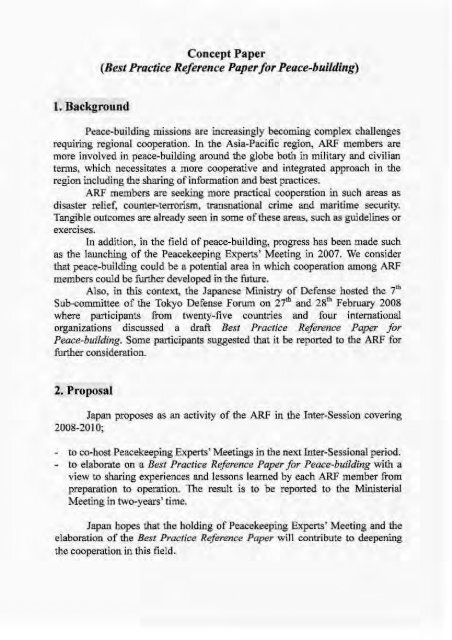
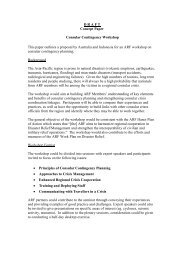
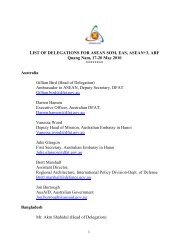
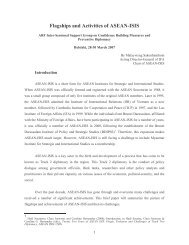
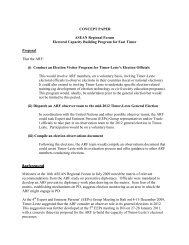
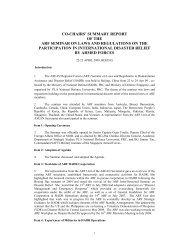
![10 ASAIN Presentation [Pakistan].pdf - ASEAN Regional Forum](https://img.yumpu.com/50649810/1/190x143/10-asain-presentation-pakistanpdf-asean-regional-forum.jpg?quality=85)
